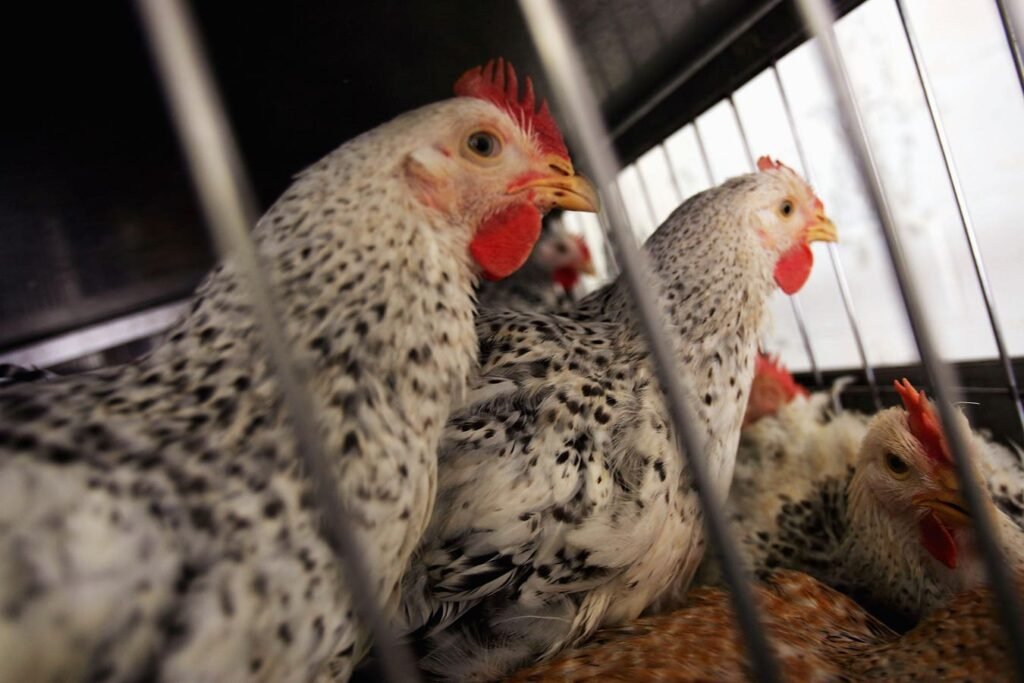NEW YORK – DECEMBER 8: Chickens wait in a cage at the Chicken Market, a live chicken dealer and … More
Getty Images
The Department of Health and Human Services announced today that they are canceling a $760 million contract with Moderna for a bird flu vaccine, stating that further development “was not scientifically or ethically justifiable.” The cancellation comes after Moderna received positive interim data from a trial testing the safety and immunogenicity of its H5N1 bird flu vaccine candidate. The approval of the contract with Moderna by the Biden administration did not help.
This administration’s distrust of mRNA vaccines has been apparent. In February, Rep. Adam Schiff stated that Robert F. Kennedy, Jr, the Secretary of HHS, “promoted the lie that mRNA vaccines alter human DNA.” Additionally, at least seven states have proposed GOP-sponsored legislation banning or limiting mRNA vaccines and fueling mistrust in vaccines. Kennedy has previously called mRNA COVID-19 vaccinations dangerous.
Bird Flu Vaccines
Our ability to protect the public from bird flu with vaccines is minimal. We don’t have an adequate supply of vaccine, nor are we likely to have enough eggs to make traditional vaccines. That’s why many experts have urged a shift to mRNA-based platforms. But Kennedy thinks they are dangerous…and has now killed the leading candidate vaccine.
Finland has offered the bird flu vaccine to dairy and mink farmers because of their high risk of infection. Some experts suggest it be offered to farm workers here, as well.
Saskia Popescu, an Assistant Professor of Biodefense at George Mason University, criticized the administration’s bird flu preparedness, stating, “Cutting surveillance in that [bird flu]
and then cutting budget to USDA and CDC is a sure fire way to ensure that spread is occurring and will only continue to occur because we don’t have eyes on it and we don’t have any containment measures.”
Elizabeth (Beth) Cameron, Senior Advisor to the Pandemic Center at Brown University, shared Popescu’s concerns and expanded on the government’s and the Coalition for Epidemic Preparedness Innovations’ goal of the “100 day mission.” That goal is “to be able to make any countermeasure within 100 days of emergence of the pathogen and be able to deliver it.” We have failed in that goal and the loss of the leading candidate vaccine is a huge setback.
Cameron also emphasized surveillance. “We also need to be able to detect that threat really early. That means bio surveillance networks and data, but it also means people that can actually understand what’s happening around the world and then be able to translate that data into quick public health action,” she said.
Losing federal capability through funding and staffing cuts at the FDA, CDC, and other agencies means that “more and more of the responsibilities fall to our states, our cities, our tribes, to respond to without the potential for a more united federal effort,” Cameron continued. She added, “Funding is being taken back from the COVID response funding that states have, and so states are actually losing their capability, not gaining their capability at a time when more might actually fall on them to be more prepared.”
Kennedy’s shake-up throughout HHS is affecting far more than our response to bird flu. It affects our entire public health and pandemic preparedness.
In March, Kennedy announced drastic cuts that would gut 20,000 jobs — 2,400 at the Centers for Disease Control, 3,500 at the Food and Drug Administration, and 1,200 at the National Institutes of Health. Additionally, a major restructuring of agencies is planned. Each of these agencies, and the almost totally gutted USAID, are critical to our national security. Popescu observed, “You have people coming in here who have no experience, no understanding of what these departments, agencies, divisions, etc, are doing.” She added their “lack of knowledge is making it really hard for people to get the basics done. So I’m very concerned with capacity.” These changes in structure and functioning make us less safe.
FDA And COVID-19 Vaccines
The FDA gives final approval to vaccines, historically after consultation with experts on its Vaccines and Related Biological Products Advisory Committee and the CDC’s Advisory Committee on Immunization Practices.
The VRBPAC oversees the safety, effectiveness, and appropriate use of vaccines, while the ACIP provides recommendations on who should receive the vaccines.
The Health and Human Services Department, under Kennedy, has taken away the expert groups’ decision-making capabilities.
For example, the release of the Novavax vaccine has been delayed.
Kennedy has expressed his dislike for single-antigen vaccines, and has previously criticized mRNA COVID-19 vaccinations as “dangerous.” Recently, Moderna withdrew its application for a combined flu/Covid vaccine, causing a delay in the availability of an updated Covid vaccine for the fall.
Kennedy, along with Marty Makary, Commissioner of the FDA, and Jay Bhattacharya, Director of the NIH, advocate for vaccines to undergo placebo-controlled clinical trials. However, many experts argue that it is unethical to conduct such trials when an effective treatment is already available.
In a controversial move, Kennedy has unilaterally advised against Covid boosters for pregnant women and children, going against the recommendations of the CDC. This decision has been met with opposition from the American College of Obstetricians and Gynecologists, who emphasize the importance of vaccination for pregnant women to protect both themselves and their newborns.
Furthermore, the exclusion of certain vaccines from the government’s recommended list could lead to issues with affordability and insurance coverage, causing confusion among patients and healthcare providers.
The overall impact of these decisions, coupled with growing vaccine hesitancy and anti-science sentiment, raises concerns about the potential for epidemics of preventable diseases like measles and whooping cough. With the emergence of the new COVID-19 variant NB.1.8.1, and the uncertainty surrounding the availability of an updated vaccine, the upcoming fall season may pose challenges for public health.


